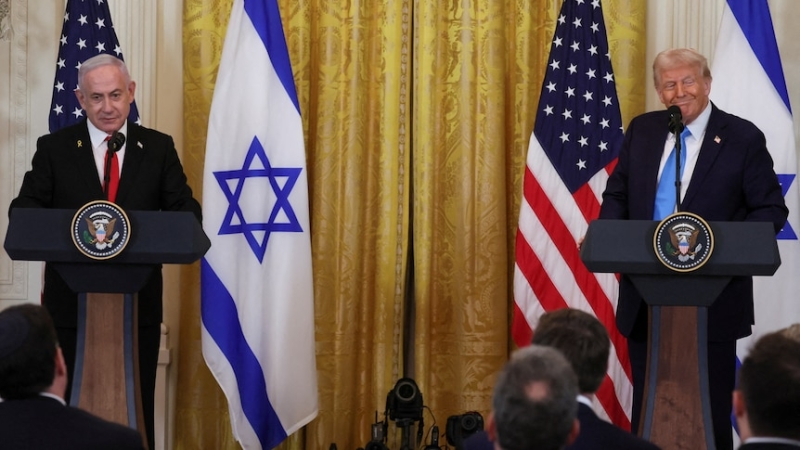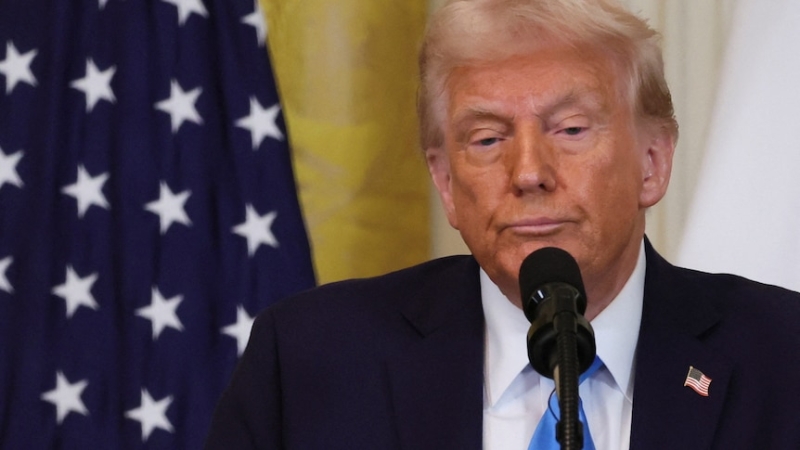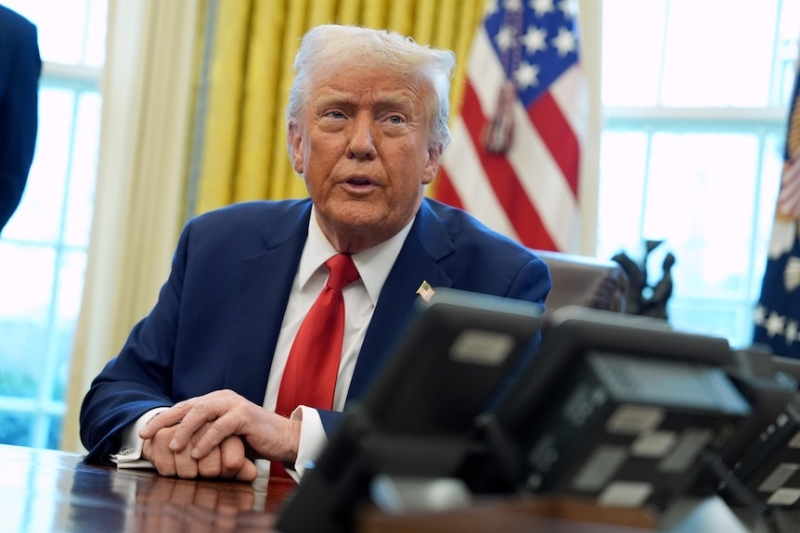It's hard to overstate just how staggering Donald Trump's proposal is. (Reuters: Leah Millis)
The Hamas attack on Israel of October 7, 2023, has been called Israel's September 11. With good reason.
On the day the Twin Towers fell in New York, we knew something fundamental had changed in the world; but we didn't yet know what.
We now know it led to America's series of forever wars in Iraq and Afghanistan, spawning a seemingly never-ending cycle of violence, at the cost of hundreds of thousands of lives.
Similarly, as the horrifying images of the Hamas attack on Israel beamed around the world, it was clear that the Middle East would never be the same again.
The immediate impact has been clear: Israel has had Gaza under siege, with tens of thousands killed in Israeli bombardments, with the conflict spilling over into Lebanon and Israel's north.
Now, we are seeing another massive change to the long-term consequences of that day.
Donald Trump was a fierce critic of America's wars in Iraq and Afghanistan — "the endless wars" as he called them — and the blood and treasure they cost the United States.
Yet today, there he was, promising a new American excursion into the Middle East — which would be illegal under international law — with the potential to spark disaster on a similar scale.
Decades of policy gone
It's hard to overstate just how staggering Donald Trump's proposal is.
He doesn't just want to permanently relocate more than 2 million Palestinians living in the Gaza Strip. He wants America to take it over — using its military, if necessary — level it, and then redevelop it into the "Riviera of the Middle East".
"As far as Gaza is concerned, we'll do what is necessary," he said.
"We're going to take over that piece, and we're going to develop it, create thousands and thousands of jobs, and it will be something that the entire Middle East can be very proud of."
Trump, Netanyahu press conference key takeaways
Photo shows Donald Trump and Israeli Prime Minister Benjamin Netanyahu hold a joint press conference.

Asked who would live there after its redevelopment, Trump said "…the people of the world."
Not Palestinians, he's asked?
"Palestinians also, Palestinians will live there. Many people will live there."
In one press conference, he threw decades of bipartisan policy — shared with key allies including the EU and Australia — in favour of a two-state solution for Israel and Palestine out the window.
No surprises Israel is in favour
But Donald Trump says a lot of things. So how seriously should the world take this?
In this case, it would seem the world should take it very seriously. This was not one of Trump's spur of the moment, stream-of-consciousness riffs at a rally or in an interview.
He first flagged the idea last week. Today, he doubled down, and added detail, while standing next to the Israeli prime minister after a meeting in the Oval Office.
For those watching, the big test would be the reaction of Benjamin Netanyahu — would he deflect Trump's remarks, or endorse them?
He endorsed.
"I think it's worth paying attention to this. We're talking about it. He's exploring it with his people, with his staff. I think it's something that could change history, and it's worthwhile really pursuing this avenue," Netanyahu said.
No surprises that Israel is in favour, but even so, it seems to be a plan steeped in delusion.
First of all, the idea that about 2 million Gazans would simply acquiesce to relocation to a refugee camp in Egypt or Jordan is unthinkable.
Trump claimed the "only reason" Palestinians want to go back to Gaza is "they have no alternative" — but that couldn't be further from the truth.
Palestinians still mark the Nakba, or Catastrophe, every year — when hundreds of thousands of Palestinians were displaced from their homes in the 1948 Arab-Israeli war, never to return.
Many of those families still keep the large iron keys to the homes they had, and to which they have always demanded the right to return.
Families in Gaza never left. And they go back generations — to times when their strip of Mediterranean coast was a far more pleasant place to live than it is now.
Donald Trump spoke about it today: "I think you will make that into an international, unbelievable place. I think the potential in the Gaza Strip is unbelievable."
But even in the more recent years of the Israeli and Egyptian blockade, when Gaza was described as the world's largest open-air prison, Gazans had a sense of pride in their home.
Many know that if they leave Gaza, there will be no going back.
Then there's the question of how it could even be done. Would 2 million people be forced out at gunpoint?
It's unthinkable the international community would accept it, despite Trump's claims that "everybody I've spoken to loves the idea of the United States owning that piece of land".
In September, the United Nations General Assembly overwhelmingly voted in favour (124-14, with Australia one of 43 member states to abstain) of a Palestinian resolution demanding Israel end its "unlawful presence" in Gaza and the occupied West Bank within a year.
In Afghanistan and Iraq, the US had military help from allies, including Australia, but it's hard to imagine them lining up this time around.
Loading
Trump undeterred
Donald Trump's plan is for Gazans to be relocated to a new "beautiful area with homes and safety" homes in Jordan and Egypt.
Both countries have already flatly rejected that idea. Saudi Arabia has also condemned it.
And remember it's illegal under international law.
Trump, however, is undeterred.
"I have a feeling that despite them saying no, the King in Jordan and the general in Egypt will open their hearts and give us the kind of land we need," he said.
When George W Bush sent US troops into Iraq, the White House was confident the Iraqi people would celebrate the fall of Saddam Hussein, and welcome the Americans and their plan to turn the country into a democracy that would be an example to the rest of the region.
It became a bloodbath. Even two decades later, the country is still struggling to stabilise.
Trump's ambitions for Gaza aren't nearly so lofty; more a real estate project than a nation-building exercise.
But his plan seems far less likely to succeed.





